Workshops, networking events and more programming
With three months to go, the committees, staff and members of the American Society for Biochemistry and Molecular Biology are putting the finishing touches on the programming and activities at the 2020 annual meeting April 4–7 in San Diego.
Just in case you need a nudge to hit that Jan. 30 deadline for last-chance scientific and outreach activity abstracts or the Feb. 5 early registration deadline, here’s a preview of the great stuff we have on tap.
More details are available here.
A workshop sampler
Mentoring from both sides: How to find, be and utilize a great mentor | 6 p.m. April 5
Mentoring should not be a scary or imposing concept — it’s really just about getting and giving advice, support and encouragement for ongoing learning. Anyone at any stage can be both mentored and mentoring at the same time. In fact, one of the most effective, supportive mentoring models involves peer mentoring groups. I am proud to be seeding mentoring groups all over the country, and I am happy to advise any groups of postdocs, grad students or young faculty who want to get a group started.
At every mentoring program I have participated in, invariably, the mentors tell me they get even more out of it than the mentees. So join me for the workshop “Mentoring from both sides: How to find, be and utilize a great mentor” to hone your skills and learn best practices. Make it your goal for the year to find someone to mentor.
My workshop is intended for trainees and faculty ready to learn practical tactics in identifying mentors, asking for mentoring support and taking the best advantage of mentoring relationships — from both sides.
— Joanne Kamens
Emerging technologies in the glycosciences | 6 p.m. April 5
Sugars, carbohydrates, saccharides and glycoconjugates, collectively known as glycans, permeate every kingdom of life, where they play critical structural and functional roles.
In the workshop “Emerging technologies in the glycosciences,” our goal is to promote the study of glycans, enabling participants to develop a more comprehensive understanding of the roles that glycans play in physiology and disease. Join us at the ASBMB annual meeting on the evening of April 5 to meet colleagues, learn about innovative solutions to glycoscience problems, interact with vendors and participate in roundtable discussions focused on addressing glycoscience challenges.
This workshop is ideal for experts, researchers new to the field and trainees. Presenters include Richard Drake, Kamil Godula, Catherine Grimes, Matt Pratt, Ajit Varki, Lance Wells and Natasha Zachara. Topics covered include approaches for glycoprotein engineering, glycomic and glycoproteomic approaches, the detection and analysis of sialic acids, modulation and detection of O-GlcNAc, tools for studying the bacterial cell wall, synthetic glycoconjugates for fine-tuning cell fate and educational opportunities.
— Natasha Zachara & Catherine Grimes
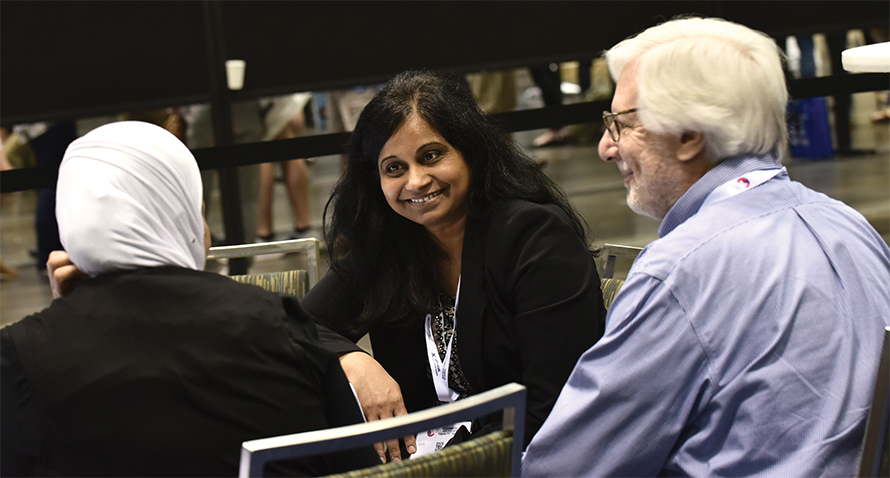
Engaging the next generation of biochemistry students | 5:45 p.m. April 6
Does it frustrate you that your students take away so little from your biochemistry class? Do you want to promote depth of understanding but feel that you just have no time to innovate?
We did too. We got frustrated. Then we got funded. We used the funding to make a comprehensive suite of modules that are demonstrated to improve educational outcomes in two core undergraduate biochemistry concepts. The first concept focuses on helping students build accurate mental models of 3D macromolecular structures from 2D images. The second concept centers on systems and dynamics — how metabolism works not only in discrete modules (e.g., glycolysis, citric acid cycle and electron transport chain) but also as part of larger and dynamic interconnected systems within cells and organisms.
We did it for all instructors, especially those who (like us) are busy and may not have time to try to incorporate the latest and greatest teaching approaches in their classrooms. So our modules come with everything: interactive activities that can be used in the classroom, as homework, or in the lab; lecture slides; clicker questions; and assessment questions. We also suggest best practices and even an assessment to tell how effective the modules are in your classroom.
You can do this. We can help. Let us help you at this year’s ASBMB meeting. You’ll do two of the modules, and you’ll see data for the effectiveness of all eight of them. We’ll also feed you.
— Rebecca Roston, Tomas Helikar & Brian Couch
Education and professional development
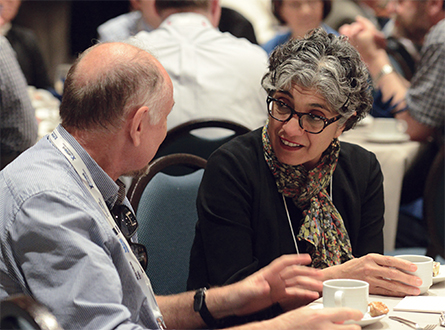.jpg)
Reimagining STEM: Who we are and what we do | 9:30 a.m. April 5 and 9:15 a.m. April 6
We lose the potential for new ideas and new perspectives when our training caters to a particular type of person. Diversifying our science, technology, engineering and math workforce demands that we rightfully challenge the norms for how we structure our classrooms, our instructional laboratories and our organizational cultures. The ASBMB Education and Professional Development Committee is sponsoring two sessions at the annual meeting on these matters.
In the first session, “Who we are: Creating a culture of wellness in science,” we will challenge the biochemistry and molecular biology community to examine who we are. Who’s missing? Where do they go, and why? What barriers do we erect in our educational and training spaces that discourage talented individuals and impel them to pursue a career elsewhere? How do these issues impact self-care? We will ask attendees to confront their own shortcomings and consider new ways to make a career in STEM accessible to all.
In our second session, “What we do: Choosing pedagogy over content,” we will challenge the biochemistry and molecular biology community to examine what we do in the classroom. Why do we teach and train in the ways that we do? Do we have evidence to justify our choices? Are there better ways that reach a broader swath of students? Do our educational and training spaces merely allow students to survive, or are we building capacity for students from a variety of backgrounds to thrive?
Advances in science and technology require collaboration and creativity. When we build structures that establish a diverse and inclusive workforce, we deepen the creative pool, fostering innovation and progress. Please join us for discussions that will challenge and inspire us to best serve tomorrow’s leaders.
— Daniel Dries & Nathan Vanderford
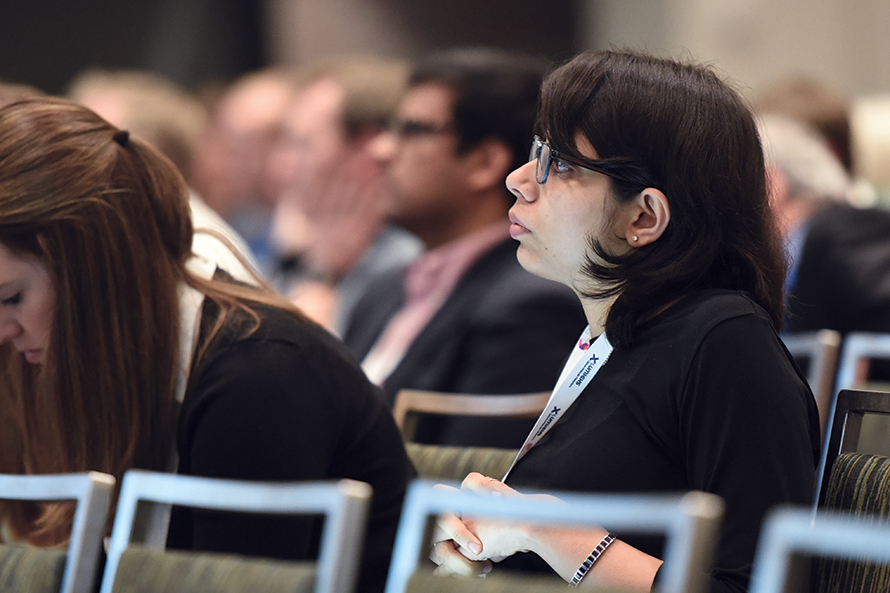
Women in BMB
Leadership awards and networking dinner | Evening of April 5
The ASBMB Women in Biochemistry and Molecular Biology Committee, or WiBMB, formed at the 2019 annual meeting, will sponsor the women’s networking event at the 2020 meeting in San Diego. The ASBMB Council has approved two awards to be presented at this event.
These annual ASBMB Leadership Awards will recognize individuals with a strong commitment to advancing the careers of women in biochemistry and molecular biology along with demonstrated excellence in research, discovery and/or service. The Early-Career Leadership Award will honor an assistant professor, associate professor or equivalent and with no more than 10 years of experience since receiving a Ph.D. and/or M.D. The Mid-Career Leadership Award will recognize those at the full-professor or senior-scientist level.
Both nominees and nominators must be members. Self-nominations are encouraged. Submit your nomination here. The deadline is Feb. 1.
Sharon Milgram, director of the Office of Intramural Training and Education at the National Institutes of Health, will speak about becoming a resilient scientist at the networking dinner.
— Susan Baserga
Publications
Data stewardship discussion, early-career investigators and award winners | Various times and dates
Research outputs are becoming increasingly complex. Ensuring that your research data will be usable in a meaningful way when you write a proposal or paper requires good data stewardship practices. Good data stewardship isn’t just about saving your data; it’s also about archiving it carefully so that others can use it in the future. It also applies to protocols and data analysis. How do you navigate all these topics and develop good habits to ensure that your data is useful in the future? How do you also handle these issues when research is more often than not a collaborative process? Kaoru Sakabe, the data integrity manager for the ASBMB, and Catherine Goodman, the scientific editor for the Journal of Biological Chemistry, will lead a panel discussion with researchers on how they tackle these important concerns.
Each ASBMB journal also will sponsor talks at the annual meeting. The Journal of Biological Chemistry will present five winners of the JBC Herbert Tabor Early Career Investigator Award, which honors first authors of papers published in the JBC during the past year. The Journal of Lipid Research will host talks by its four junior associate editors, early-career investigators who have distinguished themselves in the field of lipid research, on the theme of lipid diversity and disease. Molecular & Cellular Proteomics will host talks by three researchers on exciting biological insights revealed by proteomics.
Finally, two ASBMB award winners also are associated with the Journal of Lipid Research. Jean Schaffer, winner of the Avanti Award in Lipids, is an associate editor and Ed Dennis, winner of the Bert and Natalie Vallee Award, is a former editor-in-chief. Put their award lectures on your to-do list.
— Kaoru Sakabe & Comfort Dorn

Science outreach and communication
Poster session, hands-on workshops and flash talks | Various times and dates
Are you interested in sharing your science with students, community members, policymakers or even potential funders? Whether you’re just starting out or a seasoned professional, the ASBMB’s Science Outreach and Communication Committee will offer several workshops and activities at the annual meeting that can help you find inspiration, hone your skills, and connect with others engaged in science outreach and communication.
Learn more about science outreach initiatives run by ASBMB members from around the globe at the science outreach poster session during the opening reception on April 4. Abstract submission for this session is free and open until Jan. 30. Submit an abstract at asbmb.org/meeting2020/abstracts.
If you’d like to develop your own outreach activity, participate in a hands-on workshop, “Transforming research into outreach,” on April 6.
Do you want to focus on your communication skills? Learn how to engage your audience at “Storytelling and the art of giving a great presentation” on April 5.
Want to share your science but find that you’re short on time? Graduate students and postdoctoral travel awardees can learn how to construct an elevator pitch on April 4. Or you might consider participating in the ASBMB Student Flash Talk Science Communication Competition on April 6. Ten finalists will have just three minutes and one slide to convey the essence of their research to a nonexpert audience.
— Nicole Woitowich
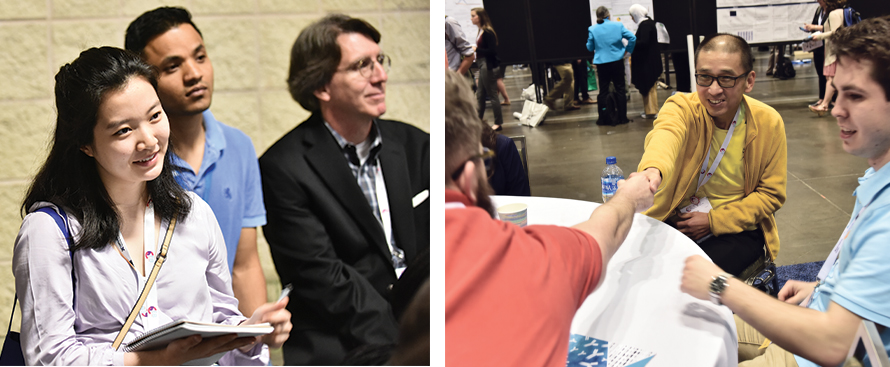
Minority affairs
Sessions on the rules of life and workplace harassment, plus a networking reception | Various times and dates
The ASBMB Minority Affairs Committee’s mission is to increase cultural diversity in the fields of biochemistry and molecular biology. This year the committee will present the session “Understanding the rules of life,” with speakers who use computational, modeling, biochemistry and molecular biology approaches to capture dynamic data, analyze changes over time, and make predictions about responses and behaviors.
You’re also invited take part in the special session titled “Best practices for preventing/managing incidences of harassment in the workplace.”
Finally, join the MAC at the ASBMB welcome reception to network with other members and learn about programs within the society. MAC programs include the annual Interactive Mentoring Activities for Grantsmanship Enhancement grant writing workshop and the Marion B. Sewer Distinguished Undergraduate Scholarship. MAC travel awardees will present their research in a poster session during the reception. Come mix and mingle with fellow scientists interested in supporting diversity and inclusion in BMB.
— Stephanie Paxson
Public affairs and science advocacy
Annual town hall | 12:15 p.m. April 5
Policies developed and enacted in Washington, D.C., have an impact on how your science is funded, how your grants are reviewed and how reliable the future workforce of the research community will be.
Join us for the ASBMB Public Affairs Advisory Committee annual advocacy town hall to hear from policy experts about critical funding and policy discussions that will directly impact your lab and the wider research community.
Public Affairs Director Benjamin Corb and Terri Kinzy, chair of the PAAC and vice president for research at Western Michigan University, will discuss the committee’s activities over the past year and how the society represents its members’ needs to policymakers on Capitol Hill and in the White House and within the federal agencies that fund your science.
Participants are encouraged to ask questions about public policy and share their stories and perspectives. Let us know how the ASBMB’s policy efforts best can represent you and your needs.
In addition, as we did last year, the Public Affairs Advisory Committee will schedule opportunities for ASBMB members to meet with program officers from the National Institutes of Health and other federal agencies. Members will have a chance to ask questions about grant writing and learn about these agencies’ funding opportunities.
— Benjamin Corb
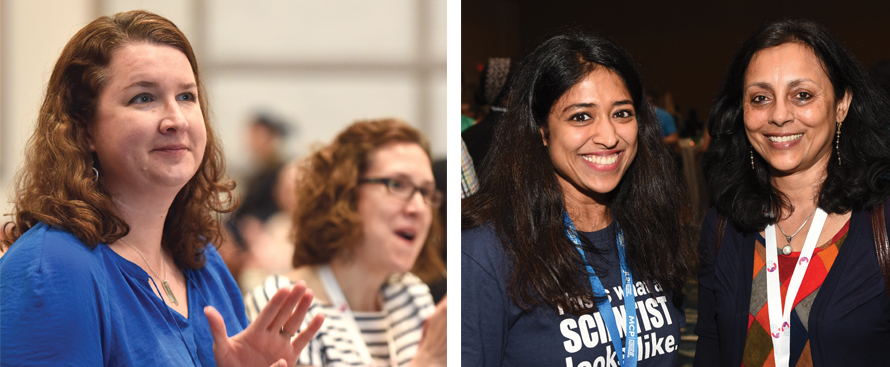
Student Chapters
Workshop on starting a chapter and networking reception | 6 p.m. and 7 p.m. April 5
The ASBMB Student Chapters program is devoted to building a community of undergraduate students and faculty members through networking, science outreach and career-development opportunities. The Student Chapters Steering Committee will host two networking events at the ASBMB annual meeting for our members and those interested in joining the program.
The first event, a workshop titled “Organizing a successful ASBMB Student Chapter,” is part of the ASBMB undergraduate programming. Members of Student Chapters and the regional directors will share advice and ideas for organizing chapter activities, getting involved with the society and hosting outreach events. Student and faculty members of the program and those interested in starting a chapter are encouraged to attend.
The second event is the ASBMB Student Chapter advisers’ networking reception. Chapter advisers will have an opportunity to network with the regional directors and other advisers. Faculty members who are interested in starting a Student Chapter at their institution are welcome to attend as well.
— Stephanie Paxson
Career Central
One-on-one coaching, CV reviews, mock interviews and more | Various times and dates
The five host societies at the Experimental Biology conference are teaming up once again to offer a variety of career services for attendees. Visit experimentalbiology.org to sign up for one-on-one career advice. You can work with a coach on your poster presentation, revising your CV and much more. Also check out the bulletin board with job postings, quick presentations on career topics and deep-dive workshops.
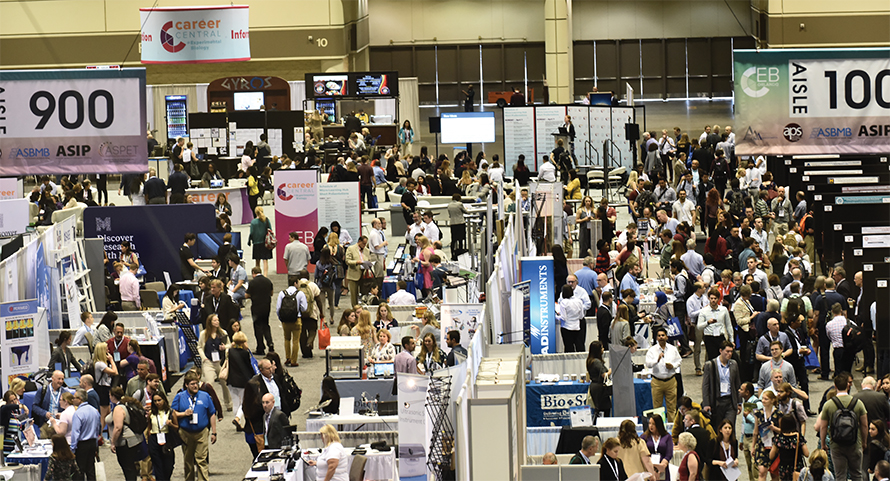
Enjoy reading ASBMB Today?
Become a member to receive the print edition four times a year and the digital edition monthly.
Learn moreFeatured jobs
from the ASBMB career center
Get the latest from ASBMB Today
Enter your email address, and we’ll send you a weekly email with recent articles, interviews and more.
Latest in Careers
Careers highlights or most popular articles

Upcoming opportunities
ASBMB's PROLAB award helps graduate students and postdoctoral fellows spend up to six months in U.S. or Canadian labs.

From humble beginnings to unlocking lysosomal secrets
Monther Abu–Remaileh will receive the ASBMB’s 2026 Walter A. Shaw Young Investigator Award in Lipid Research at the ASBMB Annual Meeting, March 7-10 in Washington, D.C.

Chemistry meets biology to thwart parasites
Margaret Phillips will receive the Alice and C. C. Wang Award in Molecular Parasitology at the ASBMB Annual Meeting, March 7-10 in Washington, D.C.

Decoding how bacteria flip host’s molecular switches
Kim Orth will receive the Earl and Thressa Stadtman Distinguished Scientists Award at the ASBMB Annual Meeting, March 7–10, just outside of Washington, D.C.

Defining JNKs: Targets for drug discovery
Roger Davis will receive the Bert and Natalie Vallee Award in Biomedical Science at the ASBMB Annual Meeting, March 7–10, just outside of Washington, D.C.

Upcoming opportunities
No matter where you are in your career and what future path you aspire to, everyone needs leadership skills. Join ASBMB for practical strategies for building and practicing leadership skills.
